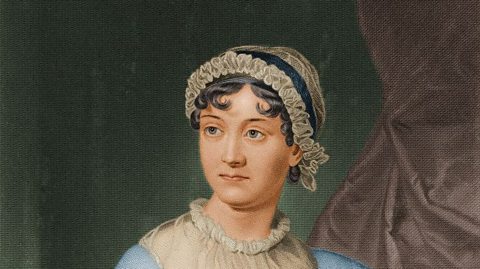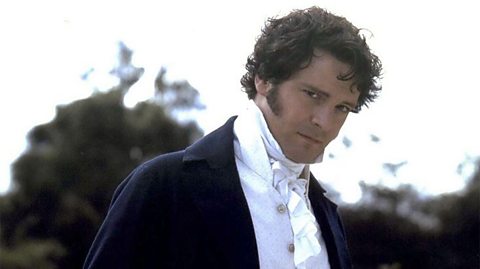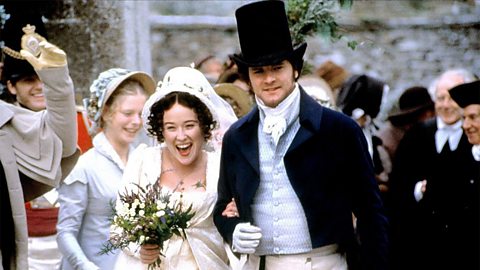Key points
In the Eduqas exam on Pride and Prejudice, which is part of Component 2: Prose and Poetry, you will be presented with one extract and a question.
This is a closed book exam, which means you will not be allowed to have a copy of the novel with you.
You will usually be asked a question about a theme or character(s).

Remember
The more time you spend planning your answers and practising writing within the time limit as part of your revision, the more confident you will feel in the final exam.
GCSE exam-style question
Planning your answer
It is a good idea to spend a few minutes planning your answer before you start writing.
You should identify the key words and plan out some of your main points.
You could plan using bullet points or a mind-map, or any other way that you find useful.

Example question
Starting with this extract, explore how Austen presents Elizabeth and Darcy's relationship in the novel.
Write about how Austen presents the relationship between Elizabeth and Darcy.
In your response you should:
- refer to the extract and novel as a whole
- show your understanding of characters and events in the novel
- refer to the context of the novel
In this extract from Volume 2 Chapter 11, Darcy proposes marriage to Elizabeth for the first time.
Click below to open the extract
After a silence of several minutes, he came towards her in an agitated manner, and thus began:
“In vain have I struggled. It will not do. My feelings will not be repressed. You must allow me to tell you how ardently I admire and love you.”
Elizabeth’s astonishment was beyond expression. She stared, colouredIn this context, it means that she blushed., doubted, and was silent. This he considered sufficient encouragement, and the avowalWhen you say or admit something that you believe, support, or plan to do. of all that he felt and had long felt for her immediately followed. He spoke well; but there were feelings besides those of the heart to be detailed, and he was not more eloquent on the subject of tenderness than of pride. His sense of her inferiority, of it being a degradationWhen the beauty or quality of something is spoiled or destroyed., of the family obstacles which judgment had always opposed to inclination, were dwelt on with a warmth which seemed due to the consequence he was wounding, but was very unlikely to recommend his suitIn this context, the act of pursuing someone romantically..
In spite of her deeply-rooted dislike, she could not be insensible to the compliment of such a man’s affection, and though her intentions did not vary for an instant, she was at first sorry for the pain he was to receive; till roused to resentmentA mixture of disappointment, disgust and anger. by his subsequent language, she lost all compassion in anger. She tried, however, to compose herself to answer him with patience, when he should have done. He concluded with representing to her the strength of that attachment which in spite of all his endeavours he had found impossible to conquer; and with expressing his hope that it would now be rewarded by her acceptance of his hand. As he said this she could easily see that he had no doubt of a favourable answer. He spoke of apprehension and anxiety, but his countenance expressed real security. Such a circumstance could only exasperate farther; and when he ceased the colour rose into her cheeks and she said:
“In such cases as this, it is, I believe, the established mode to express a sense of obligation for the sentiments avowed, however unequally they may be returned. It is natural that obligation should be felt, and if I could feel gratitude, I would now thank you. But I cannot—I have never desired your good opinion, and you have certainly bestowed it most unwillingly. I am sorry to have occasioned pain to anyone. It has been most unconsciously done, however, and I hope will be of short duration. The feelings which you tell me have long prevented the acknowledgment of your regard can have little difficulty in overcoming it after this explanation.”
Mr. Darcy, who was leaning against the mantelpiece with his eyes fixed on her face, seemed to catch her words with no less resentment than surprise. His complexion became pale with anger, and the disturbance of his mind was visible in every feature.

Exam top tip
The extract is there to help you: use it to generate ideas for answering the question in full.
Inspecting the question
Before you start writing your answer, make sure you understand the question properly by asking yourself:
1. What are the key words in the question?
- ‘write about’ – this word is reminding you to think about a range of ideas from the whole of the novel to answer the question.
- ‘how’ – this word asks you to look at the writer’s choice of language and techniques. What tools have they used?
- ‘Elizabeth and Darcy’s relationship’ – the question focuses on just these two characters and how they interact with one another.
- ‘presented’ – remember, the characters and the relationship are created by Austen. What ideas is she trying to express or show us through Elizabeth and Darcy’s relationship?
2. What are some important moments in Elizabeth and Darcy’s relationship?
You might choose to write about:
- Their first meeting at the Meryton ball
- Their interactions in Netherfield when Jane is ill
- Darcy’s first marriage proposal
- Darcy’s letter to Elizabeth explaining what happened with Wickham
- Elizabeth’s visit to Pemberley
- Darcy’s second marriage proposal.
3. How does Elizabeth and Darcy’s relationship change throughout the novel?
You might choose to write about:
- Darcy’s refusal to dance with Elizabeth at Meryton, and the Bennet sisters’ response to this
- Darcy hiding his changing feelings towards Elizabeth when she is caring for Jane at Netherfield
- Elizabeth’s initial acceptance of Wickham’s story about Darcy, and her reaction when she finds out it is not true
- Their witty interactions at dinners with Lady Catherine
- The contrast between Darcy’s attitude in his first marriage proposal and his second
- The influence of other characters on their relationship
- Ideas about both of their attitudes towards marriage.
Assessment Objectives (Eduqas)
Your exam response will be marked using Assessment Objectives.
The ones for this question are below.
| What is the objective? | How do I do well? |
|---|---|
| AO1: the quality of your ideas, understanding of the text and use of supporting evidence. | Stay focused on the question and show that you understand the text and the writer’s messages well. Use evidence clearly and carefully to support your answer. |
| AO2: analysis of the writer’s methods and effects. | Explain how the writer uses different tools to create meaning. Use the correct language to explain these techniques and their effects on the audience. |
| AO3: use of contextual ideas to support your argument. | When it’s relevant, refer to context points that support your answer. These can be social, historical or biographical. |
Structuring your answer
At the start of your answer, it is helpful to have a short introduction.
An effective introduction should give a summary of the ideas you are about to present, and link to the question and the writer’s message.
After your introduction, each paragraph should include:
- A topic sentence, which uses some of the language of the question, to introduce your argument
- Evidence that supports your argument
- Analysis of the effects of language techniques
- A final sentence that acts as a mini-summary.
An awareness of the writer’s purpose is important. You should also remember to include references to context when they are relevant to the point you are making.
You might include a short conclusion that summarises the key ideas in your answer.
Activity
Example answers
Read and compare these two sample answers to the question:
Starting with this extract, explore how Austen presents Elizabeth and Darcy's relationship in the novel.
Write about how Austen presents the relationship between Elizabeth and Darcy.
In your response you should:
- refer to the extract and novel as a whole
- show your understanding of characters and events in the novel
- refer to the context of the novel.
In this extract from Volume 2 Chapter 11, Darcy proposes marriage to Elizabeth for the first time.
Click below to open the extract
After a silence of several minutes, he came towards her in an agitated manner, and thus began:
“In vain have I struggled. It will not do. My feelings will not be repressed. You must allow me to tell you how ardently I admire and love you.”
Elizabeth’s astonishment was beyond expression. She stared, colouredIn this context, it means that she blushed., doubted, and was silent. This he considered sufficient encouragement, and the avowalWhen you say or admit something that you believe, support, or plan to do. of all that he felt and had long felt for her immediately followed. He spoke well; but there were feelings besides those of the heart to be detailed, and he was not more eloquent on the subject of tenderness than of pride. His sense of her inferiority, of it being a degradationWhen the beauty or quality of something is spoiled or destroyed., of the family obstacles which judgment had always opposed to inclination, were dwelt on with a warmth which seemed due to the consequence he was wounding, but was very unlikely to recommend his suitIn this context, the act of pursuing someone romantically..
In spite of her deeply-rooted dislike, she could not be insensible to the compliment of such a man’s affection, and though her intentions did not vary for an instant, she was at first sorry for the pain he was to receive; till roused to resentmentA mixture of disappointment, disgust and anger. by his subsequent language, she lost all compassion in anger. She tried, however, to compose herself to answer him with patience, when he should have done. He concluded with representing to her the strength of that attachment which in spite of all his endeavours he had found impossible to conquer; and with expressing his hope that it would now be rewarded by her acceptance of his hand. As he said this she could easily see that he had no doubt of a favourable answer. He spoke of apprehension and anxiety, but his countenance expressed real security. Such a circumstance could only exasperate farther; and when he ceased the colour rose into her cheeks and she said:
“In such cases as this, it is, I believe, the established mode to express a sense of obligation for the sentiments avowed, however unequally they may be returned. It is natural that obligation should be felt, and if I could feel gratitude, I would now thank you. But I cannot—I have never desired your good opinion, and you have certainly bestowed it most unwillingly. I am sorry to have occasioned pain to anyone. It has been most unconsciously done, however, and I hope will be of short duration. The feelings which you tell me have long prevented the acknowledgment of your regard can have little difficulty in overcoming it after this explanation.”
Mr. Darcy, who was leaning against the mantelpiece with his eyes fixed on her face, seemed to catch her words with no less resentment than surprise. His complexion became pale with anger, and the disturbance of his mind was visible in every feature.
Example answer 1

Answers could include:
Other characters think Darcy has a poor attitude towards Elizabeth. When they first meet at a ball in Meryton, Darcy refuses to dance with Elizabeth. He rejects her because she is not pretty enough and other men are not dancing with her either. Mrs Bennet is sympathetic, telling Elizabeth: “I should not dance with him, if I were you”. The tone used by Austen suggests that Mrs Bennet has made her mind up about Darcy and is instructing Elizabeth to keep away from him because of how impolite he has been.
Darcy and Elizabeth’s relationship changes as they find themselves in more situations where they can get to know each other. Darcy sees how caring Elizabeth is towards Jane, and Elizabeth seems to enjoy her arguments with Darcy. The narrator says that ‘Darcy had never been so bewitched by any woman as he was by her’. The verb ‘bewitched’ implies that Darcy cannot look away from Elizabeth, like there is something magical about her. This is reinforced by Darcy’s first marriage proposal, where he tells Elizabeth how ‘ardently’ he admires her: a word that suggests a surprising level of passion and interest.
By the end of the novel, the relationship has changed dramatically. Elizabeth accepts Darcy’s second proposal because he has been honest with her and they have both overcome their pride. Elizabeth’s statement that “it is settled between us already that we are to be the happiest couple in the world” shows how firm she is in her decision to accept Darcy’s proposal and how committed they are to each other. Austen gives the couple a happy ending, along with other couples in the novel, to show the many ways love and marriage can be expressed.
Feedback
- There is some focus on the question but there could be more explanation, instead of describing what happens.
- The answer includes some good quotations and references to the writer’s methods, but more detail is needed on the effects of those methods and the writer’s purpose.
- The answer could include some more relevant context points – about class or marriage, for example.
Example answer 2

Answers could include:
Austen presents Darcy and Elizabeth as incompatibleUnable to co-exist or be together harmoniously. at the outset. The tone is set by their first meeting at the Meryton ball, where Darcy refuses to dance with Elizabeth. His reasons for rejecting her are pettySmall and unimportant problems or issues., and he can only bring himself to describe her as ‘tolerable’. Not only does this word remind the reader of the importance of class and status, but it also suggests that Darcy does not see Elizabeth as worthy of his time and attention. Elizabeth’s response, which is to tell this story with ‘great spirit’ to her friends, is a significant contrast in tone and shows their opposing attitudes.
*As the novel continues, Darcy and Elizabeth’s relationship becomes more combativeKeen to fight or argue. as they get to know each other, though both of them seem to enjoy their disagreements. They argue frequently, using rhetoric and very quick sarcasm. However, Darcy begins to reflect on his prejudices as he sees how caring and loyal Elizabeth is with others and how witty she is in conversation.
The omniscient narrator is used to show us Darcy’s changing feelings in the line ‘Darcy had never been so bewitched by any woman as he was by her’. The verb ‘bewitched’ juxtaposed with the adverb ‘never’ implies that Darcy has a strong and unique connection with Elizabeth, as though there is something magical about her that draws them together. There is a refusal to acknowledge these feelings at first or change his behaviour, so they continue to argue – which partly explains Elizabeth’s surprise when Darcy first proposes marriage to her. This is supported by the juxtapositionTwo words or ideas placed close together to create a contrasting effect. of ‘ardently’ and ‘admire’: one word suggesting passion, and the other suggesting a more distant friendship.*
By the end of the novel, Darcy and Elizabeth’s relationship has changed dramatically because they are honest and open with each other. They have both overcome their pride, and Elizabeth has realised her depth of feeling for Darcy after the confrontation with Lady Catherine. Elizabeth’s statement that “it is settled between us already that we are to be the happiest couple in the world” shows how firm she is in her decision to accept Darcy’s proposal and how committed they are to each other. Austen gives the couple the happiest ending, signalling her view that marrying for love and happiness is a desirable alternative to the Georgian custom of marrying for wealth and status.
Feedback
- The answer is focused on the question and takes a thoughtful and evaluative approach.
- The quotations are well-chosen and analysed in detail, with comments on specific effects of the writer’s methods.
- The answer shows a good understanding of the relationship between Darcy and Elizabeth and its place in the wider narrative.
- The answer uses appropriate context points to support the argument.
- The answer could consider other points in the relationship that change it from combative to romantic – when Darcy writes his letter of explanation about Wickham, for example.
Other exam-style questions
You could use the following questions to revise your knowledge of the novel and practise writing your ideas.
1. How is the character of Jane presented in Pride and Prejudice?
Write about how the character of Jane is presented in Pride and Prejudice.
Some ideas:
- Jane is presented as kind, patient and generous.
- Austen uses Jane’s openness to contrast with Elizabeth’s pride.
- Jane often hides her true feelings: as the eldest daughter, she feels a responsibility to be composedStaying calm and having your feelings under control. and polite, even when she is treated badly by others.
2. Explore how Austen presents ideas about class and status in the novel.
Write about how class and status are presented in Pride and Prejudice.
Some ideas:
- Status is an important issue for many of the characters in the novel, and it is often decided by class.
- Austen presents Darcy’s attitude to class and status as representative of his prejudiceAn unfairly negative attitude towards another person or group. and a barrier to his happiness.
- The character of Lady Catherine gives the reader a clear sense of the power of class and status, as she is treated with respect by others despite her rudeness and critical nature.
3. How does Austen explore the theme of love in Pride and Prejudice?
Write about how the theme of love is presented in Pride and Prejudice.
Some ideas:
- This theme is closely linked to ideas about marriage and family.
- Austen uses the romantic relationships in the novel to explore social expectations and the purpose of marriage.
- Some characters are dismissive about love, like Mrs Bennet and Charlotte, who believe that financial security is more important.
More on Pride and Prejudice
Find out more by working through a topic
- count1 of 5

- count2 of 5

- count3 of 5
